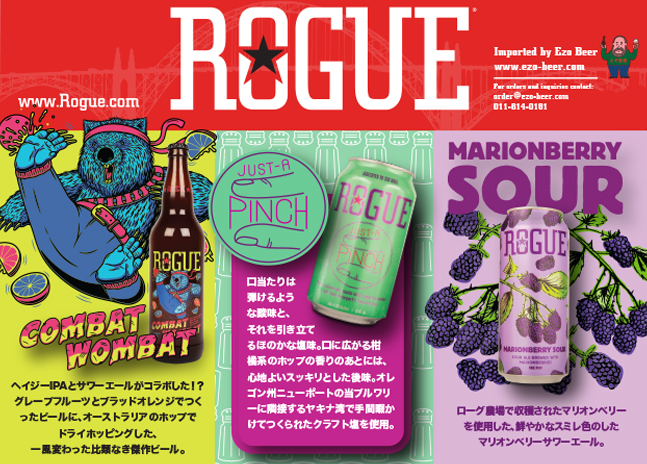Rogue Ales has been a powerhouse of the craft beer movement in America for over 30 years. Founded in 1988 in Oregon, Rogue was one of the first American craft breweries to be imported to Japan thanks to the trailblazing efforts of Phred Kaufman, founder of Ezo Beer in Hokkaido. For thousands of people in Japan, Rogue was their introduction to American craft beer.
Like many legacy breweries in this day and age, Rogue has had to redefine itself. Some of that has had to do with leadership change in the company, as well as the retirement of John Maier, the famous brewer long associated with Rogue. More significantly, consumer behavior and tastes have changed. Traditionally, Rogue beers were a standard-setter of the Pacific northwest, with malty ales showing a lot of complexity and hop character. But consumers these days always seem to be searching for that ‘next thing’. Which means breweries have to keep brewing that next thing.
When three new beers from Rogue hit the market in Japan recently, we were intrigued. Their styles marked a significant departure from the heavier ales that Ezo Beer had been offering for at least a decade. We gave them a try and this is what we thought:
—
Combat Wombat
A sour IPA? We were admittedly skeptical. Maybe that’s because we were so used to Rogue’s typically malt-rich, hoppy IPAs. Sour IPAs are quite unusual, too, even in America. The very concept of matching bitterness with sourness can spurn some doubt. But this worked in a weirdly beautiful way. The beer is not puckeringly sour for starters–it’s more like a good umeshu. And there’s evident but not overpowering hop bitterness (IBU 49). The balance of bitterness and sourness is supported by a velvety, medium body (that benefits from additions of wheat and oats). This gives way to a fruity finish thanks to the grapefruit and blood orange added. Citra and Galaxy hops accentuate that fruitiness. This would be divine with yakitori and a squirt of ume sauce. Or any kind of shiso-maki.
Marionberry Sour
Another sour ale. There seems to be a pattern here. It looks like grape juice in the glass, pours with a good, frothy head, and has a faint berry aroma. Bright fruit flavor gives way to a slightly puckering tartness. We get little maltiness or hop bitterness. The point of this beer seems to be that it showcases the marionberry, a fruit native to Oregon and similar to the blackberry. After a few more sips, the sour ale base becomes evident in the background. Japan has quite a legacy of fruit beers–they’ve been a part of the craft beer industry from the start. This one should be well received by all the palates acclimated to the style. It’s also unique. Serve it with some yakiniku. The acidity will cut through the fattiness for rich flavor.
Just a Pinch
Yes, another sour ale, and this one, too, comes with a surprise: a ‘pinch’ of salt. The beer’s salinity is reminiscent of a gose, though that’s not what they call it. Light amber in color with good effervescence, it has a nose both tart and fruity. We catch notes of mandarin orange and aloe. The body is on the light side and smooth. Like the other two beers, it’s tart but not puckering. The salt is harvested from Yaquina Bay near the brewery. It gives the beer a surprisingly dry finish. At 4.5% alcohol, this went down quite well and we’d definitely grab another if we had one. This beer was our favorite. You could drink it as a session beer or pair it with just about anything. It struck us as rather versatile.
—
It’s interesting that Rogue’s new releases focus on the sour category, but not as some might have expected. These didn’t come from a barrel-aging program, which helped to (re)popularize sours. They are, insofar as we can tell, kettle sours–made that way through the brewing process. The sourness is tempered and well balanced by the other flavors in the beers. We like the spotlight on special local ingredients, too. These are definitely food-friendly beers.
Sours are not (yet) popular in Japan. We think that’s because they are simply new. Retail buyers might be reluctant to buy these, and consumers to try these, but once they discover them, we think the response will be good. We’d bring these to a home party of friends or a cookout. Tell us what you think if you do the same.
(Ezo Beer retail business orders: order@ezo-beer.com)




